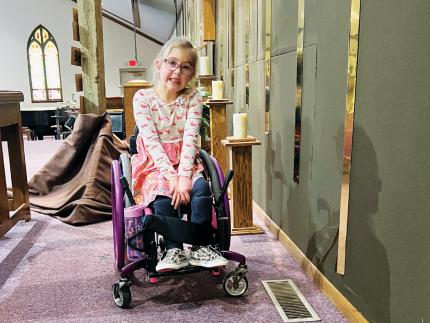Rising Up at Pease CRC

Kennedy Van Zee smiled widely, rocked back and forth in her wheelchair, and moved her arms in time with the music as she sang along with some 20 other girls on the stage of Pease (Minn.) Christian Reformed Church on GEMS Sunday.
Pease CRC, organized in 1895, is an integral part of the small town of Pease, founded in Minnesota by Dutch settlers just a year earlier and located about 60 miles northwest of Minneapolis.
At home during the previous week, Kennedy had practiced the words of the songs the GEMS Girls’ Club would present as part of the special worship service on March 31. And in the final song before the offering and the sermon, Kennedy and the others eagerly sang: “Rise up, rise up, those who have hope in the Lord. Rise up, rise, like eagles rise!”
Though Kennedy had been on the stage to sing during worship services in the past, this occasion was different. As a seven-year-old who has spina bifida, she was delighted to be there with her friends because one of the church members, the owner of a construction company, had built a ramp allowing her to more easily access the stage in her wheelchair.
“Building the ramp for Kennedy was a beautiful thing. It is a big deal for our church,” said Trudy Ash, a member of the church and a regional connector for Thrive. “The ramp is one example of how churches can translate their love for God into intentionally including others.”
In the past Kennedy’s father had to carry her up and settle her in her wheelchair on the stage before she could sing the praises she had diligently practiced before worship services at the church.
But on this day her dad pushed her up and positioned her near the pulpit. And during the service, she was surrounded by many of her friends, all members of GEMS, an acronym for Girls Everywhere Meeting the Savior. All of the girls wore light-blue GEMS t-shirts for the occasion as well.
“Kennedy loves to sing at home,” said her mother, Heather Van Zee. “She has a speech delay, and she needs to practice. I remember when they first built the ramp. We were in the church building that day, and she was so excited that she wanted me to come see it.”
Now that the ramp has been built, Kennedy and her father, Brian, are regular members of the praise team and sing during services once a month.
“Kennedy loves church so much. My husband will stand up there with her, and they raise their arms and sing together with the others,” said Heather Van Zee, a criminal justice professor at Northwestern University in St. Paul, Minn. Her husband is a second-grade teacher.
Construction of the ramp, she added, is an example of how their church seeks to include everyone in the life and worship of their community.
“That ramp makes a huge difference for her,” said Heather. “In so many places, people don’t think about inclusion. But we have to think about that every day wherever we go. That ramp means a lot to all of us. It is one less thing we have to advocate for.”
Lindsay Wieland Capel, disability consultant for Thrive, said she is pleased to see how members of Pease CRC took the time and effort to build the ramp, making it easier for Kennedy to live out her love for leading others in worship.
The 2024 Yearbook of the CRC indicates that about two-thirds of churches have a barrier-free pulpit area. That leaves about 380 churches that have yet to make that part of the church accessible.
More broadly, though, most CRC churches have made sure that the entrance to their facility is accessible. Current Yearbook numbers show that all but 157 churches have barrier-free entrances.
“I think churches often don’t realize the unintended impact that barriers in their architecture have,” said Wieland Capel.
For example, she said, “Maybe someone has been leading the congregational prayer for years, but they quietly ask to be removed from the list of volunteers because they can’t do stairs anymore. Or maybe someone who uses a walker is overlooked as a Scripture reader.”
“Kennedy and Pease are reminding us that people with all types of bodies and minds have leadership gifts and that our architecture can either encourage or discourage those gifts,” said Wieland Capel.
Thrive encourages churches to appoint a church disability advocate or committee and offers resources like an accessibility audit that can help them determine what barriers they may have in their architecture, communication, or culture.


